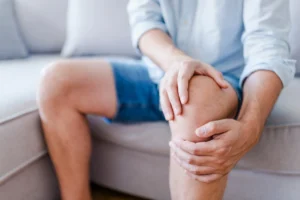What Is The Most Common Reason For Knee Pain?
Understanding the causes of knee pain is essential in addressing the discomfort many individuals experience. One of the most common reasons for knee pain is arthritis, particularly osteoarthritis. This condition is a degenerative joint disease that results from the wear and tear of the cartilage that cushions the knee joint. As the cartilage wears down, the bones in the knee joint rub against each other, leading to pain, swelling, and decreased functionality.
Age and weight significantly impact knee health as well. As people age, they are more likely to develop osteoarthritis due to the cumulative years of stress placed on their knees. Additionally, being overweight can put extra pressure on the knee joints, accelerating the degenerative process. Managing weight through diet and exercise is a crucial step in preventing and managing knee pain.
Cartilage and ligaments play a vital role in knee functionality. Damage to these structures is a common source of knee pain. For instance, the meniscus is a crucial piece of cartilage that acts as a shock absorber. Tears in the meniscus, often caused by twisting motions or sudden stops, can lead to significant pain and immobility. Similarly, injuries or deterioration of ligaments such as the ACL or MCL are also frequent contributors to knee pain.
Book your appointment today at Bull City PT’s Durham – Charlotte – Brier Creek offices.
What Causes Pain In The Knee Without Injury?
Knee pain without apparent injury can be perplexing and often leads individuals to seek medical advice to uncover the root cause. Understanding these causes can guide effective treatment and management strategies.
Common Conditions: Bursitis and Tendinitis
Two common conditions that can result in knee pain without a specific injury are bursitis and tendinitis. Bursitis occurs when the small fluid-filled sacs, known as bursae, become inflamed, typically due to overuse or repetitive movements. Similarly, tendinitis involves inflammation of the tendons, often resulting from repetitive stress or improper mechanics during activities. These conditions signal inflammation and may lead to chronic knee pain if not addressed promptly.
Underlying Systemic Conditions
Chronic knee pain without a direct injury can also stem from underlying systemic conditions such as rheumatoid arthritis or lupus. These autoimmune diseases can provoke the body’s immune system to attack healthy tissues, including those in the knee, leading to persistent pain and discomfort. Detecting these conditions early is essential to prevent further joint damage and to initiate appropriate treatment.
Role of Inflammation and Repetitive Stress
Inflammation plays a critical role in many cases of knee pain that occur without apparent injury. Prolonged or mismanaged inflammation can degrade joint structures over time. Additionally, repetitive stress from habitual activities such as long periods of standing, kneeling, or participating in sports without adequate rest can result in microtrauma. Over time, these can accumulate into noticeable discomfort.
In conclusion, understanding the potential causes of knee pain without injury can aid in determining the best course of action for treatment and prevention. Professional guidance from physical therapists, like those at Bull City PT, can assist individuals in managing these conditions effectively.
How Do I Know If My Knee Pain Is Serious?
Recognizing when knee pain is serious is crucial for ensuring you receive the appropriate care and intervention. Certain symptoms and warning signs strongly indicate that medical attention is needed. Identifying these signs early can help prevent further complications and aid in a more effective recovery process.
Symptoms That Indicate a Serious Condition
A few symptoms serve as key indicators of a potentially serious knee issue. Persistent or severe pain, especially following an injury, is a notable concern. If the knee pain is accompanied by an inability to bear weight on the leg, this could signify a fracture or severe ligament injury. Redness, warmth, or significant fever could also point to an infection requiring immediate medical evaluation.
Warning Signs: Swelling, Instability, or Locking
Additional warning signs include considerable swelling, persistent instability or a feeling of the knee giving way, and episodes where the knee locks into place. These symptoms may suggest ligament tears, cartilage damage, or other structural issues that warrant thorough examination by a healthcare professional.
Brief periods of discomfort or slight aches are common and often resolve with rest and self-care measures. However, persistent symptoms, particularly those affecting your ability to perform daily activities, should not be ignored.
Importance of Early Diagnosis and Intervention
Seeking prompt attention for serious knee pain can significantly impact recovery. Early intervention often limits the extent of further damage, speeds up healing, and reduces the need for more invasive procedures like surgery. Should you see a doctor or physical therapist first? A qualified therapist or physician can help diagnose the cause of your discomfort, whether it involves a physical examination, imaging tests, or both.
At Bull City PT, our priority is to address your knee pain with the utmost care, ensuring you receive a comprehensive evaluation to identify any serious underlying conditions accurately. By understanding these symptoms and seeking timely care, you can make educated decisions about your knee health and quality of life.
How Do I Stop The Pain In My Knee?
Overview of Home Remedies and Lifestyle Changes
Stopping knee pain often begins with simple lifestyle changes that can reduce discomfort and improve mobility. Rest is a crucial component, giving your knee the chance to recover from stress or minor injuries. Icing the knee can help to reduce inflammation and swelling, which is particularly beneficial if the pain is accompanied by visible swelling. Elevating your knee on a pillow while resting can further enhance recovery by promoting blood flow away from the swollen area.
Weight management and low-impact exercises, such as swimming or cycling, can strengthen the muscles around the knee joint, providing better support and reducing the likelihood of pain. Flexibility exercises, particularly yoga and stretching, can also contribute to pain relief by relieving tension in the muscles and tendons around the knee.
Effective Medications and Their Role in Pain Relief
For those seeking faster pain relief, over-the-counter nonsteroidal anti-inflammatory drugs (NSAIDs), such as ibuprofen or naproxen, can be effective in reducing knee pain and inflammation. These medications work by blocking pain signals and reducing inflammation. It is important to follow medication guidelines and consult with a healthcare provider before using these for prolonged periods, as they can have side effects.
Topical pain relievers, such as creams containing capsaicin, may also provide relief by interfering with pain signal transmission. These can be applied directly to the painful area and are often used in conjunction with oral medications for more comprehensive pain management.
When to Consider Physical Therapy or Surgery
How do I know if I need physical therapy? If home remedies and medications do not alleviate your knee pain, it might be time to consider professional treatment options. Physical therapy can be highly effective for knee pain management, focusing on strengthening muscles, improving flexibility, and correcting alignment to reduce stress on the knee joint.
Surgery is typically considered a last resort for those with severe knee damage or degenerative conditions like osteoarthritis. Procedures may vary from arthroscopic surgery for minor repairs to total knee replacement for advanced degeneration. Consult with a healthcare professional to evaluate your individual case and determine the best course of action.
At Bull City PT, we specialize in creating personalized therapy plans tailored to your unique needs, ensuring the most effective approach to pain relief and rehabilitation. Explore our comprehensive services and take the first step towards a pain-free life by scheduling an appointment today at our Brier Creek location.








